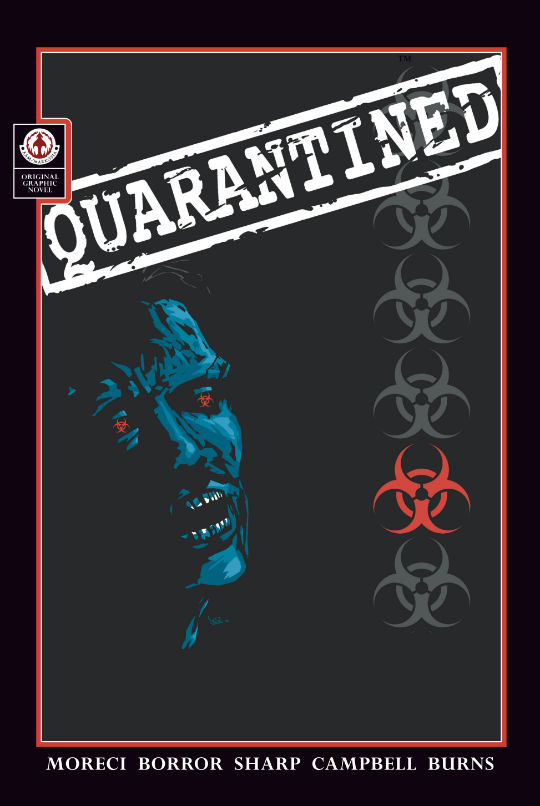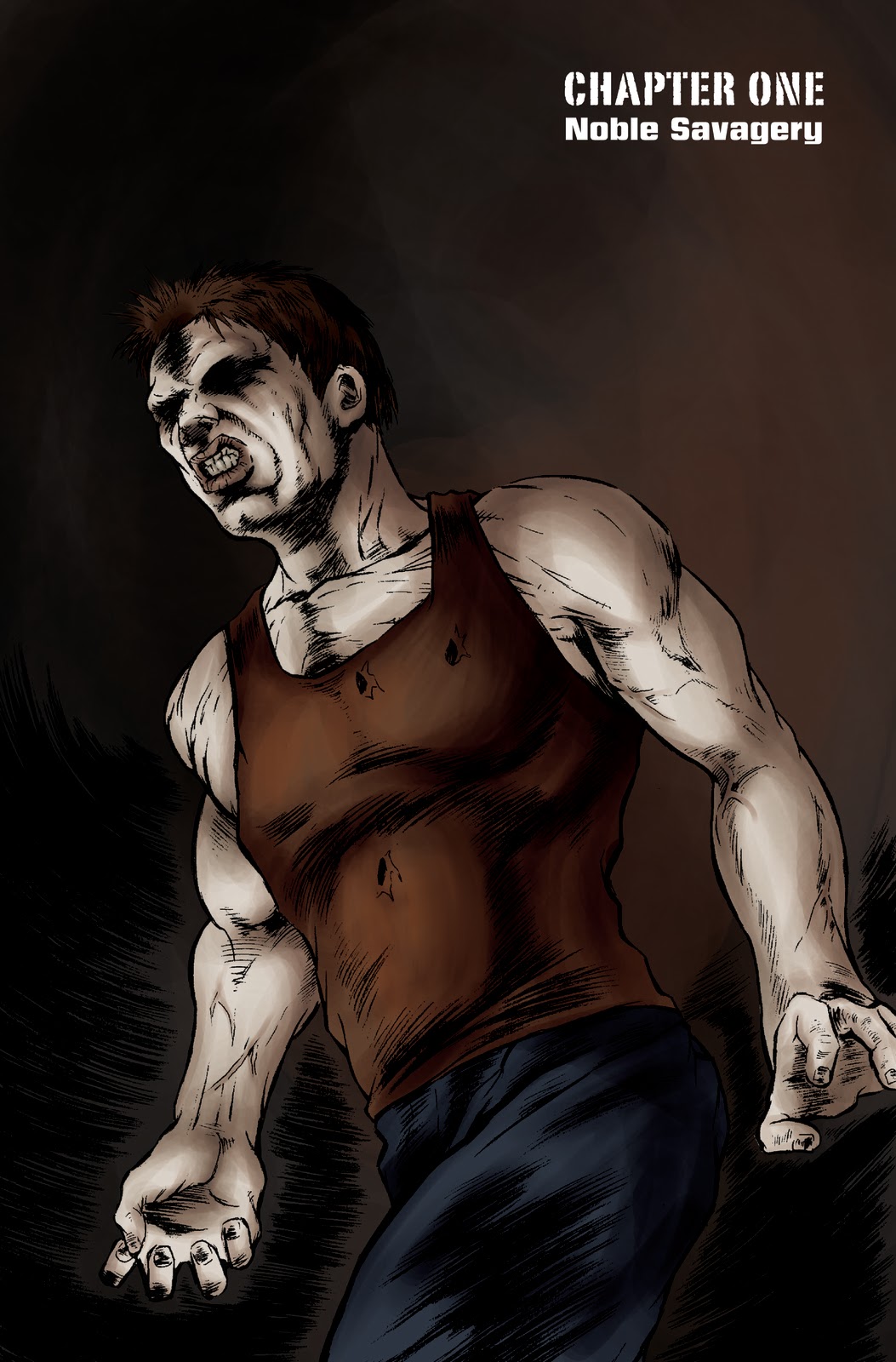| « Bookmarks | Reading Under the Influence: "Boxes" @ Sheffield's » |
Interview Mon May 30 2011
Discussing Quarantined with Michael Moreci
With the release of his first full graphic novel Quarantined (reviewed here in depth), I sat down with writer Michael Moreci to discuss the genesis of his work, his influences, and what's on the horizon for this up-and-comer.

My first question would have to be, where did the inspiration for this graphic novel come from?
Inspiration is a funny thing. I think as a writer, you have to be more pragmatic with your work than anything. Ideas are fleeting things--every writer has them. The challenge is being able to sit down and put in the work required to develop those ideas, and to then discover which work and which don't. Some ideas -- good ideas, at times -- are just dead-ends, and it's hard to let them go.
Specifically to Quarantined, it was one of those concepts kicking around my head, had been for a while. And when it came down to having a proper vehicle for telling the story I wanted to tell, the concept behind Quarantined was a prefect match. I wrote the book, after all, in a relatively different time -- still under the Bush era, closer to terror levels, corrosive paranoia, all those things. So a book about a lurking threat in an isolated location made sense to me. It still does. I wanted to do what [John] Carpenter did, what [George] Romero did: analyze society through a microcosm. I can't stand all these apocalyptic stories that involve the F.B.I. and the president and global agencies -- it feels so absolutely inhuman. There's nothing to connect to. I wanted to isolate a cast of characters, to have them be at the same time very real and represent the inherent conflicts of society.
As for zombies, well, that's simple. They're a lot of fun, and there's so much you do with the genre. I grew up on horror movies; my older brother was a big fan, and I was introduced to stuff like Nightmare on Elm Street and Halloween at a very early age. It's in me to tell that kind of story -- I love being scared, and I love being able to mix in some brain candy with the thrills.
You touched on a proper vehicle for telling this story. To spin that a bit, why did you opt for paper printing? Was Quarantined always envisioned as a hard copy graphic novel or did you tinker around with the idea of web publishing at all?
I always saw Quarantined as a book, from the start. One of my favorite things about the comics form is serialized storytelling. Unfortunately, it's getting harder for that type of storytelling to exist. There's lots of talk within the comics community about sales, publishing models, inundation of weekly books, price points, etc, and they are all striking close to the heart of the monthly pamphlet. And while I think there is cause for concern, my main difficulty with the monthly pamphlet is staying current. Let's face it: We live in a hyperactive, dizzying culture. There is such a wealth of entertainment -- good entertainment, too -- and our attention span isn't what it once was. Comics shipping isn't like, say, AMC TV where you know a show will be on every Sunday for 12 straight weeks and then break; comics come out monthly, they're oftentimes late, and in the span of one month, so many other things have happened. If I read Daredevil one month, I probably read 20 more different comics before the next one comes out. When I sit down to read the latest Daredevil, then, I'm often wondering, "What the hell is going on is this book again?" That's why trades are becoming way, way more appealing to me. You get a complete arc, something whole and easy to reference when the next one comes out. Though, admittedly, a 25-year habit is making it tough to break away from my beloved monthlies completely.
As for digital, I'm all for it. There's a lot I still need to learn, but I'm excited about the prospects digital offers, in terms of new readers the technology can bring in and the extras you can add (Double Feature Comics, in fact, layers a great "director's commentary" component to their content, which I love). I have my own digital series, titled Reincar(Nate), being released with Viper Comics in the fall -- and we have a lot of fun, interesting bonuses that we're going to be adding with each issue. As a creator, I'm thrilled; if people are investing their time and money into my work, I want to give them everything I can. Combine technology, willingness, and the subtraction of print costs, and there are so many opportunities to do just that.

Comics, for me, are primarily appealing because they are so highly serialized. Does Quarantined have a sequel on the horizon?
I love comics for the same reason. But I do think the definition of a serialized story has been muddied over the years. There's a difference, I'd say, between a story being serialized and a story being ongoing. Y: The Last Man was serialized; it was a specific story told in parts. That, to me, is a serial -- one story broken down into chunks. I'd contend that Spider-Man, for example, isn't a serial because it goes on forever (and the character appears across myriad titles, making the idea of a cohesive story impossible). It's fun to think about this stuff, because the idea of a serialized story has become so highly evolved. And this is due in large part to the golden age of television we're experiencing. Joe Casey recently touched on this in his back matter to Butch Baker, how TV is beating comics at its own game. I don't know what to make of that--as long as comics are producing books like DMZ, The Sixth Gun, and The Unwritten, we have just as sophisticated storytelling. But, at the same time, books like those exist on the margins, while shows such as Mad Men and Lost flourish. Plus, they get people thinking about the storytelling itself; no one really asked how many seasons a show was going to air for, or how long a comic would run for, until Lost. Not to a large degree, anyway. Now you have Cullen Bunn saying how long The Sixth Gun will run and Nick Spencer doing the same for Morning Glories. I think that's great; those kinds of stories (and handling of stories) are absolutely essential to the future of comics.
As for a Quarantined sequel, that's a tricky question to answer. I can say we're working on the details, and it looks promising. I definitely would love to do more. What I have in mind is less of a sequel and more of a continuation. I've already written a lot of what the second volume will be, and I can say that it's strikingly different from the first, in tone, theme, and storytelling. It'll take readers to some unexpected places. I'll be honest, I was still at least somewhat green when I wrote Quarantined. I had these big, grand plans for the book, and some of them didn't fit into that first arc. I mean, the book is really long as is! So there's a lot of material -- especially character back stories -- that is integral to what's to come.
I would say that ongoing comics are serialized (such as Spider-Man) in that they progress for an indefinite period but deliver compartmentalized stories ala Flash Gordon, Doctor Who or other golden age cinema serials and that tales like Y: The Last Man, Ex Machina, 100 Bullets and DMZ are more episodic since they do have an envisioned end point, even if the creators haven't set in stone an official place to stop when issue #1 hits the stands. Nevertheless, that definition is essentially splitting hairs since it is a fine line to separate serials from episodes.
As for a follow up question, you mentioned the first installment of Quarantined was written during the Bush-era and a lot of that fear and mistrust that pervaded the political scene post-9/11 filtered into your work. Since a continuation is being constructed, does the Obama administration's political climate influence your work in a similar way?
I agree with what you're saying -- that's true, comics are compartmentalized, and they are written with that trajectory in mind, to end each issue with a push into the next. And that's part of the fun. You're right that -- the definition doesn't matter as much as the story itself.
As for your question...that's an interesting question, because this administration has influenced the tenor of the second book, but in an indirect way. It's made me withdraw deeper into the characters and approach the story on a more personal level. There's a difference between being disgusted with an administration, and being disappointed. The disappointment feels more personal, and I think that's a symptom of Obama's campaign. He reached out to voters on a personal level, promising fulfillment of hopes and dreams. As we've seen, a lot of those promises have failed to materialize. Granted, a lot of that isn't squarely Obama's fault, and I'm willing to live with that. What's shocking, though, is the way he's been demonized, even when he has done right by the vast majority of people. There cannot be victories in this country anymore. Even when you've won, you've also lost. And that feeling definitely informed how the first volume of Quarantined ends. I've caught some flak for those final pages, which I expected. But I wanted to give that sense of despair, of tragedy; it's that feeling of the end of Godfather II, where Michael is looking over the water. He's won, but he's also lost.
Going off of that, what's really informing the next part of Quarantined is the vast divides between the ideals and desires of people in this country. At the heart of Quarantined lies a fundamental question about our society: if you put people's backs against the wall, can they overcome their squabbles and band together for the greater good? At this isn't just political, it never is. A lot of it has to do simply with the human experience -- we're flawed, greedy, petty, and, at times, vicious. All of us. It may sound cynical, but it's true. What 's become infinitely apparent, over the past five years or so, is that people don't have the ability to band together communally. Not when self-preservation is on the line.
Sounds fantastic. Good insights into your work. Thanks a bunch.
Thanks again for the review and the great questions.









